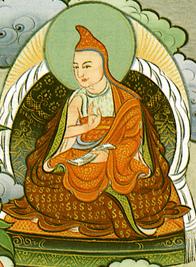Thirteen great texts: Difference between revisions
Jump to navigation
Jump to search
mNo edit summary |
No edit summary |
||
| Line 56: | Line 56: | ||
* ཆོས་དང་ཆོས་ཉིད་རྣམ་པར་འབྱེད་པའི་ཚིག་ལེའུར་བྱས་པའི་མཆན་འགྲེལ་ (1-21) | * ཆོས་དང་ཆོས་ཉིད་རྣམ་པར་འབྱེད་པའི་ཚིག་ལེའུར་བྱས་པའི་མཆན་འགྲེལ་ (1-21) | ||
* དབུས་དང་མཐའ་རྣམ་པར་བྱེད་པའི་ཚིག་ལེའུར་བྱས་པ་ཞེས་བྱ་བའི་མཆན་འགྲེལ་ (23-70) | * དབུས་དང་མཐའ་རྣམ་པར་བྱེད་པའི་ཚིག་ལེའུར་བྱས་པ་ཞེས་བྱ་བའི་མཆན་འགྲེལ་ (23-70)<ref>Translated by Dharmachakra Translation Committee, 2006</ref> | ||
* ཤེར་ཕྱིན་མཆན་འགྲེལ་ཡན་ལག་ (71-75) | * ཤེར་ཕྱིན་མཆན་འགྲེལ་ཡན་ལག་ (71-75) | ||
: {{LH|topics/prajnaparamita/prologue-abhisamayalankara-commentary-khenpo-shenga|Prologue to Abhisamayalankara Commentary}} | : {{LH|topics/prajnaparamita/prologue-abhisamayalankara-commentary-khenpo-shenga|Prologue to Abhisamayalankara Commentary}} | ||
| Line 87: | Line 87: | ||
* དབུ་མ་ལ་འཇུག་པའི་འགྲེལ་མཆན་ལེགས་པར་བཤད་པ་ཟླ་བའི་འོད་ཟེར་ (1-535) | * དབུ་མ་ལ་འཇུག་པའི་འགྲེལ་མཆན་ལེགས་པར་བཤད་པ་ཟླ་བའི་འོད་ཟེར་ (1-535) | ||
==Notes== | |||
<small><references/></small> | |||
==Further Reading== | ==Further Reading== | ||
*Maitreya, ''Middle Beyond Extremes: Maitreya's Madhyãntavibhãga with commentaries by Khenpo Shenga and Ju Mipham'' translated by Dharmachakra Translation Committee, Ithaca: Snow Lion, 2006 | |||
*Dreyfus, Georges. “Where Do Commentarial Schools Come From? Reflections on the History of Tibetan Scholasticism” in ''Journal of the International Association of Buddhist Studies'' (Vol. 28, No. 2), 2005, pp. 273 – 297 | *Dreyfus, Georges. “Where Do Commentarial Schools Come From? Reflections on the History of Tibetan Scholasticism” in ''Journal of the International Association of Buddhist Studies'' (Vol. 28, No. 2), 2005, pp. 273 – 297 | ||
Revision as of 11:49, 24 May 2012

Thirteen great texts (Tib. གཞུང་ཆེན་བཅུ་གསུམ་; Wyl. gzhung chen po bcu gsum) - thirteen of the most important Indian shastras, which, together with the commentaries by Khenpo Shenga, formed the basis of the curriculum in many of the shedras of Eastern Tibet, especially Dzogchen Shri Singha.
- Pratimoksha Sutra by Shakyamuni Buddha
- Vinayasutra by Gunaprabha
- Abhidharma-samuccaya by Asanga
- Abhidharmakosha by Vasubandhu
- Mulamadhyamaka-karika by Nagarjuna
- Madhyamakavatara by Chandrakirti
- Chatuḥshataka shastra by Aryadeva
- Bodhicharyavatara by Shantideva
- Abhisamayalankara by Maitreya
- Mahayanasutralankara by Maitreya
- Madhyantavibhanga by Maitreya
- Dharmadharmatavibhanga by Maitreya
- Uttaratantra Shastra by Maitreya
Tibetan Texts
Konchhog Lhadrepa edition in 7 volumes, Delhi, 1987
The Root Texts (rtsa ba) (རྩ་བ་)
- དགེ་སློང་ཕའི་སོ་སོར་ཐར་པའི་མདོ་ (1-67)
- འདུལ་བ་མདོ་རྩ་བ་ (69-267)
- འཕགས་པ་གཞི་ཐམས་ཅད་ཡོད་པར་སྨྲ་བའི་དགེ་ཚུལ་གྱི་ཚིག་ལེའུར་བྱས་པ་ (269-313)
- འཕགས་པ་གཞི་ཐམས་ཅད་ཡོད་པར་སྨྲ་བའི་དགེ་ཚུལ་གྱི་ཚིག་ལེའུར་བྱས་པ་ (315-326)
- ཆོས་མངོན་པའི་མཛོད་ཀྱི་ཚིག་ལེའུར་བྱས་པ་ (327-414)
- ཆོས་མངོན་པ་ཀུན་ལས་བཏུས་པ་ (415-591)
- དབུ་མ་རྩ་བའི་ཚིག་ལེའུར་བྱས་པ་ཤེས་རབ་ (593-661)
- དབུ་མ་ལ་འཇུག་པ་ (663-728)
- བསྟན་བཅོས་བཞི་བརྒྱ་པ་ཞེས་བྱ་བའི་ཚིག་ལེའུར་བྱས་པ་ (729-788)
- སྟོང་ཉིད་བདུན་ཅུ་པ་ (789-803)
- རིགས་པ་དྲུག་ཅུ་པ་ (805-817)
- རྩོད་པ་བཟློག་པ་ (819-831)
- ཞིབ་མོ་རྣམ་པར་འཐག་པ་ (833-841)
- བྱང་ཆུབ་སེམས་དཔའི་སྤྱོད་པ་ལ་འཇུག་པ་ (843-978)
- ཤེས་རབ་ཀྱི་ཕ་རོལ་ཏུ་ཕྱིན་པའི་མན་ངག་གི་བསྟན་བཅོས་མངོན་པར་རྟོགས་པའི་རྒྱན་ (979-1022)
- ཐེག་པ་ཆེན་པོ་མདོ་སྡེའི་རྒྱན་ (1023-1152)
- དབུས་དང་མཐའ་རྣམ་པར་འབྱེད་པའི་ཚིག་ལེའུར་བྱས་པ་ (1153-1171)
- ཆོས་དང་ཆོས་ཉིད་རྣམ་པར་འབྱེད་པའི་ཚིག་ལེའུར་བྱས་པ་ (1173-1185)
- ཐེག་པ་ཆེན་པོ་རྒྱུད་བླ་མའི་བསྟན་བཅོས་ (1187-1255)
Volume 1
- འདུལ་བ་མདོ་རྩ་བའི་མཆན་འགྲེལ་པདམ་དཀར་པོའི་ལྗོན་ཤིང་ (1-643)
Volume 2
- སོ་སོར་ཐར་པའི་མདོ་ཡི་མཆན་འགྲེལ་ (1-140)
- དགེ་ཚུལ་གྱི་ཚིག་ལེའུར་བྱས་པ་སུམ་བརྒྱ་པ་ཞེས་བྱ་བའི་མཆན་འགྲེལ་ (141-227)
- འཕགས་པ་གཞི་ཐམས་ཅད་ཡོད་པར་སྨྲ་བའི་དགེ་ཚུལ་གྱི་ཚིག་ལེའུར་བྱས་པ་ (229-250)
- བྱང་ཆུབ་སེམས་དཔའི་སྤྱོད་པ་ལ་འཇུག་པ་ཞེས་བྱ་བའི་མཆན་འགྲེལ་ (251-475)
- ཐེག་པ་ཆེན་པོ་རྒྱུད་བླ་མའི་བསྟན་བཅོས་ཞེས་བྱ་བའི་མཆན་འགྲེལ་ (477-581)
Volume 3
- ཆོས་དང་ཆོས་ཉིད་རྣམ་པར་འབྱེད་པའི་ཚིག་ལེའུར་བྱས་པའི་མཆན་འགྲེལ་ (1-21)
- དབུས་དང་མཐའ་རྣམ་པར་བྱེད་པའི་ཚིག་ལེའུར་བྱས་པ་ཞེས་བྱ་བའི་མཆན་འགྲེལ་ (23-70)[1]
- ཤེར་ཕྱིན་མཆན་འགྲེལ་ཡན་ལག་ (71-75)
- ཕར་ཕྱིན་འགྲེལ་མཆན་གཞན་ཕན་སྣང་བ་ (77-393)
- ཐེག་པ་ཆེན་པོ་མདོ་སྡེ་རྒྱན་ཅེས་བྱ་བའི་མཆན་འགྲེལ་ (395-645)
Volume 4
- སློབ་དཔོན་སངས་རྒྱས་གཉིས་པའི་རྣམ་ཐར་ཐར་ལམ་སྣང་བྱེད་ (1-8)
- ཆོས་མངོན་པའི་མཛོད་ཀྱི་ཚིག་ལེའུར་བྱས་པའི་མཆན་འགྲེལ་ཤེས་བྱའི་མེ་ལོང་ (9-321)
- ཐེག་པ་ཆེན་པོའི་ཆོས་མངོན་པ་ཀུན་ལས་བཏུས་པའི་མཆན་འགྲེལ་ནོར་བུའི་མེ་ལོང་ (323-733)
Volume 5
- སློབ་དཔོན་ཀླུ་སྒྲུབ་ཀྱི་རྣམ་ཐར་མདོར་བསྡུས་སུ་བཀོད་པ་ (1-10)
- དབུ་མ་རྩ་བའི་ཚིག་ལེའུར་བྱས་པ་ཤེས་རབ་ཅེས་བྱ་བའི་མཆན་འགྲེལ་ (11-145)
- དབུ་མ་འཇུག་པའི་འཆད་ཐབས་ (147-149)
- དབུ་མ་ལ་འཇུག་པ་ཞེས་བྱ་བའི་མཆན་འགྲེལ་ (149-285)
- བསྟན་བཅོས་བཞི་བརྒྱ་པ་ཞེས་བྱ་བའི་ཚིག་ལེའུར་བྱས་པའི་མཆན་འགྲེལ་ (287-441)
- དབུ་མ་རྩོད་ཟློག་གི་ས་བཅད་ (443-448)
- རྩོད་པ་ཟློག་པའི་ཚིག་ལེའུར་བྱས་པ་ཞེས་བྱ་བའི་མཆན་འགྲེལ་ (449-471)
- སྟོང་པ་ཉིད་བདུན་ཅུ་པའི་ཚིག་ལེའུར་བྱས་པ་ཞེས་བྱ་བའི་མཆན་འགྲེལ་ (473-495)
- རིགས་པ་དྲུག་ཅུ་པའི་ཚིག་ལེའུར་བྱས་པ་ཞེས་བྱ་བའི་མཆན་འགྲེལ་ (497-535)
- ཞིབ་མོ་རྣམ་པར་འཐག་པ་ཞེས་བྱ་བའི་མདོའི་མཆན་འགྲེལ་ (537-552)
- དབུ་མའི་ཐལ་བཟློག་ (553-568)
- དབུ་མའི་སྨོན་ལམ་ (569-574)
Volume 6
- དབུ་མ་ལ་འཇུག་པའི་འགྲེལ་མཆན་ལེགས་པར་བཤད་པ་ཟླ་བའི་འོད་ཟེར་ (1-535)
Notes
- ↑ Translated by Dharmachakra Translation Committee, 2006
Further Reading
- Maitreya, Middle Beyond Extremes: Maitreya's Madhyãntavibhãga with commentaries by Khenpo Shenga and Ju Mipham translated by Dharmachakra Translation Committee, Ithaca: Snow Lion, 2006
- Dreyfus, Georges. “Where Do Commentarial Schools Come From? Reflections on the History of Tibetan Scholasticism” in Journal of the International Association of Buddhist Studies (Vol. 28, No. 2), 2005, pp. 273 – 297